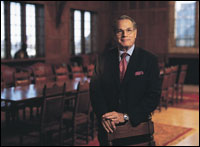Cannon & Dunphy prevails over Habush in privacy lawsuit
By: David Ziemer, [email protected]//June 8, 2011//
Cannon & Dunphy prevails over Habush in privacy lawsuit
By: David Ziemer, [email protected]//June 8, 2011//

Cannon & Dunphy SC has prevailed over personal injury rival Habush Habush & Rottier SC in a dispute involving not personal injury, but invasion of privacy.
Milwaukee County Circuit Court Judge Charles Kahn held on Wednesday that the Habush firm proved every element of the tort, except one: unreasonableness.
In 2009, the Cannon firm contracted with Google and other search engines for a sponsored link using the words “habush” and “rottier.” When internet users would enter those terms into the search engine, the link to the Cannon firm would appear at the top of the page, above the “organic” results generated in response to Google’s standard algorithm.
The Habush firm sued under Wisconsin’s invasion of privacy statute, sec. 995.50.
The Cannon firm raised two affirmative defenses: freedom of speech and the unclean hands doctrine; but the court rejected both.
The court found the speech unprotected by the First Amendment, concluding, “The argument fails because the use of a computerized system to sequence search results is not speech. … It is not information; nor is it a message of any sort. It is not speech, commercial or otherwise. Therefore, it is not subject to the protection of the First Amendment.”
The court also rejected the unclean hands defense. Although the Habush firm’s site also appears when a user searches for the Cannon firm on yellowpages.com, the court found it was not deliberate on the part of the Habush firm, but that the ads were offered by the publisher as a bonus for purchasing ad space on the back cover of the print directory.
Turning to the elements of invasion of privacy, the court found that, by specifying the names ‘habush’ and “rottier” as search terms with Google, the Cannon firm “used” those names as a matter of law.
Second, the court found that the use was “for advertising purposes or for purposes of trade.” Kahn wrote, “there can be no reason for defendants to use the plaintiffs’ names other than for purposes of trade.”
Third, it was undisputed that the key words “habush” and “rottier” are names of living persons.
Fourth, the court found that the use was without consent.

The Cannon firm asserted that the Habush firm consented to use by entering into its own agreements with Google, but the court found that consent must be express under the statute.
But when the court came to fifth element – whether the use was unreasonable – it found that it was not.
Kahn analogized the Cannon firm’s conduct to a car dealership opening across the street from a competitor. He also found similarities with commercial districts, such as the Garment District and Diamond District in New York City.
“The first business owner at any location may have been quite unhappy to see others come to take advantage of his or her success,” he said. “But the primacy of competition as an economic policy has protected the right of others to share the block.”
Kahn concluded, “The time may come when a legislature, regulatory board, or supreme court determines that the conduct at issue in this case is deceptive and misleading and therefore improper. But no such body has yet drawn this conclusion. … In the absence of any clear prior determination that defendants’ actions are unethical, there is no support for plaintiffs’ argument that the principles of attorney conduct make them unreasonable.”
Attorney J. Ric Gass, who represented the Cannon firm, praised the holding as good for competition and for consumers.
“It is particularly valuable for firms and lawyers who can’t afford huge expensive television campaigns,” said Gass, of Gass Weber Mullins LLC. “It levels the playing field, and enables them to get their names in front of the public. What Cannon & Dunphy were fighting to achieve is the right of attorneys to compete and do exactly the same thing to them.”
James Clark, attorney for the Habush firm, could not be reached for comment.
Gass noted that other firms have done the same to the Cannon firm, but that they have never objected or requested them to cease and desist.
“Cannon & Dunphy ensured other attorneys’ right to compete with them,” he said.
Gass said it also is good for consumers shopping for an attorney, because, “consumers don’t necessarily shop for, so-to-speak, ‘the best attorney’ but ‘the best attorney for them.’ The way they do that is to ‘kick the tires’ of different attorneys, and the easiest way to do that is on the Internet.”
Gass noted that what Cannon & Dunphy did is done in every other industry, and is standard practice in political campaigns.
“This just happens to be the first decision in the legal field,” he said.
Legal News
- State Bar leaders remain deeply divided over special purpose trust
- Former Wisconsin college chancellor fired over porn career is fighting to keep his faculty post
- Pecker says he pledged to be Trump campaign’s ‘eyes and ears’ during 2016 race
- A conservative quest to limit diversity programs gains momentum in states
- Wisconsin prison inmate pleads not guilty to killing cellmate
- Waukesha man sentenced to 30 years for Sex Trafficking
- 12-year-old shot in Milwaukee Wednesday with ‘serious injuries’
- Milwaukee man convicted of laundering proceeds of business email compromise fraud schemes
- Giuliani, Meadows among 18 indicted in Arizona fake electors case
- Some State Bar diversity participants walk away from program
- Wisconsin court issues arrest warrant ‘in error’ for Minocqua Brewing owner
- Iranian nationals charged cyber campaign targeting U.S. Companies
WLJ People
- Power 30 Personal Injury Attorneys – Russell Nicolet
- Power 30 Personal Injury Attorneys – Benjamin Nicolet
- Power 30 Personal Injury Attorneys – Dustin T. Woehl
- Power 30 Personal Injury Attorneys – Katherine Metzger
- Power 30 Personal Injury Attorneys – Joseph Ryan
- Power 30 Personal Injury Attorneys – James M. Ryan
- Power 30 Personal Injury Attorneys – Dana Wachs
- Power 30 Personal Injury Attorneys – Mark L. Thomsen
- Power 30 Personal Injury Attorneys – Matthew Lein
- Power 30 Personal Injury Attorneys – Jeffrey A. Pitman
- Power 30 Personal Injury Attorneys – William Pemberton
- Power 30 Personal Injury Attorneys – Howard S. Sicula











